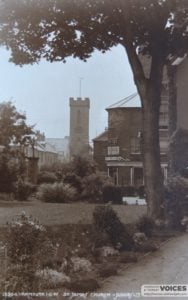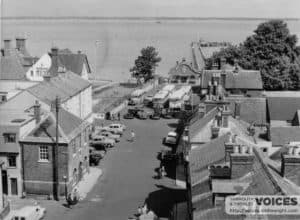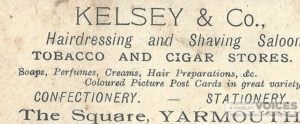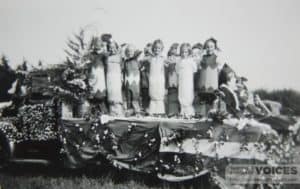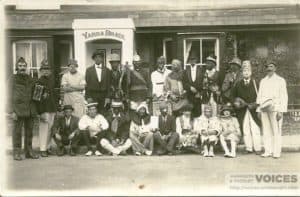When I worked in Mills Café we used to have to go across the Square with a big urn, – it took 2 of us to carry it – fill it up with boiling water in Mills Bakehouse, carry it back across the Square to the café and put it on the gas stove. We used to do this 2 or 3 times a day depending on how busy we were. The tea was 1d a mug. The cake shop was downstairs and tearoom upstairs. Palma Ault nee Holloway b1927
Author Archives: Jill Cowley
Betty Coates-Evans: Shops, Holdings
My first job when I left school was working in the sweet shop, which Mr. Holding bought in 1952. It had been Kelseys but he modernised it. He owned the whole block at that time. There was still a barber’s shop in a room at the back of the Town Hall, and a toy and souvenirs shop next to the sweet shop. It’s been a cafe, gift shop, ice cream shop and now it’s a Delicatessen. Betty Lock
- Kelseys, which became Holdings sweet shop, the Square.
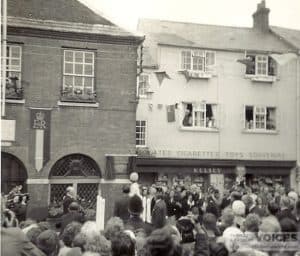
Queen Elizabeth II unveils plaque on Town Hall 1965. .Kelseys confectioners seen in background: photo Terry Henderson
Eileen Smith: Shops in Yarmouth 1930s, 1940s
In the town there were 27 shops, 1 fish and chip shop on the corner of South Street and Tennyson Road, 1 garage in Quay Street ( now the Pharmacy), 4 pubs and hotels and 2 chimney sweeps, Mr. Chambers and Mr. Holloway. There were 4 grocers shops – one in Station Road, Mr. Cook’s – later Mr. Burt’s -, one now called Sixpenny Corner owned by Mr. Barnett, Harry Mills in the Square, and Higginbothams. There were coupons given with Bourneville Cocoa and such like. My mother collected enough to get me a wooden pencil box at the Sixpenny Corner shop.
If you took an egg with you when you went to Batchelor’s for chips, they’d cook that for you too. Eileen Smith nee Lansdowne b 1921
Eileen Lansdowne, Pauline Hatch: Shops 1930s
In the Square, next to the Town Hall and a bit behind it, where Annette’s the hairdresser is now, there was a cobbler’s, Mr. Donovan. He had a wooden leg.
On the other side of the Town Hall, on the side towards the sea, was Kelsey’s, with Jimmy Gobini’s gents hairdressers in one side, and a tobacconist and confectioners on the other. Then there was a ‘bits and pieces’ shop. It was amazing what us children could buy for 2d. Mills Tea Rooms was on the corner. Eileen Smith nee Lansdowne b1921
I can remember Mr Donovan with a wooden leg, the shoemender. He used to swear like a trooper and I think he used to drink a bit. We used to have to take our shoes down there and he used to put great big thick rubber bits on to make them last. He had a very nice wife and a son called John who became a policeman. He was a fierce old man and it was a grotty old place tacked on to the Town Hall. Pauline Harwood nee Hatch b 1930
Joan Cooper: Shops, the Square 1920s
When I first left school, I worked in the local post office, then moved to Kelsey’s confectioners. Tobacco was sold there too and Lord Seely would come in to buy his Balkan Soubrani – insisting on me serving him. My aunt was Assistant Matron at Cheam School where Lord Seely had been a pupil, – Prince Phillip went to Cheam School too.
Joan Cokes nee Cooper b 1918
Shops: Kelseys Confectioners 1930s
Laurie Kelsey was in charge. Laurie, we didn’t know her by that. We used to call her Aunt Annie. She was nice, she was deaf, wasn’t she. She used to have long tray of sweets uncovered, with a glass top on and she always had a chair in the corner for us little’uns to get up on to so we could have a good look to see what sweets she’d got. She sold toys and all. Next to that was Saxbury’s souvenirs, postcards, mostly things about the Island, Yarmouth and all that. Phil Kelsey b 1920
We used to run into Kelsey’s, stand on the chair they had and choose our sweets from the big glass jars. We couldn’t see over the counter. Pat Burt nee Adams b 1929 and Annette Haynes nee Holloway b 1929
b 1929
Effie Pitman: Shops 1930s
When I finished school, I had a week off then I started work the day the old king died, George V, in January 1936. I started work for 7/6 a week at the shop in the Square, where the Deli is now. It was a hairdresser one side and Kelsey’s confectioners and tobacconists the other. Mr. Gobini was the barber. He was Italian. He charged 4d for a haircut, except for Dr. Drummond. He paid 6d and went into the back room to have his hair cut on his own. I used to work in the barbers in the morning and go into Kelsey’s confectioners if I was needed. Seven and a half years I worked there.
Mrs Walton from the Terrace used to come in to buy those little cigarillos she smoked. One day I remember when she was walking across the Square, the elastic must have ‘gone’ in her French Knickers and they fell down. She just stooped down and picked them up, and carried on walking.
Effie Pitman b 1921
Effie Pitman: Yarmouth Carnival Brownie Floats
The Brownie Floats
I did enjoy the carnivals. Every year we had to think of something different. ‘ Christmas Crackers’ was an early one. We did ‘Pansy Faces’ another year, and a ‘Flower Garden’; we made the base look like a basket. We’d collect everything together, all the bits and pieces, and make the costumes all ourselves. We didn’t tell the parents what our float was going to be, so it was always a surprise. Effie Pitman b 1921 Brown Owl for 40 years

Effie Pitman, Bown Owl, stands on float waiting to join parade from Green. 1985 was the year before she retired as Brown Owl.
Eileen Smith: Yarmouth Carnival 1930s – 70s
The Yarmouth Carnivals were a highlight of the year, always held on a Thursday, early closing day. There were maybe 4 bands, proper bands. They were wonderful .
The fishing competition on the Pier used to draw over a hundred rods. My Grandfather, Robert May, supplied the Rod for first prize.My aunt was asked if she’d like to keep up the tradition after he died, but she said no, it was the end of an era, and Harwood’s took over giving the prize.
Robert May awards the prize rod for the fishing competition on the pier
During Carnival Week there were harbour sports, greasy pole and swimming races off the Common. All the families joined in and won prizes too. Yarmouth was a town of families, now it’s a town of holiday homes. Eileen Smith nee Lansdowne b 1921
Stuart Holloway: Free Time, Yarmouth Institute
Perce Bennett was President after the war. When no longer a Billiards player, he would always provide the young chaps with a “tanner” for the light meter so they could play and he could watch.
Bert Ablitt enjoyed playing Billiards with the younger players so he could coach them. When a wrong shot was taken, Bert would replace the balls, explain the best shot to play and let the young player continue.
The Institute has always been the relaxation centre for local people, led by local tradesmen. In 1952 when the “Old Comrades Club” based in the Castle was wound up, the ‘old comrades’ wanted somewhere to play cards and billiards as they had done in the Castle, and many transferred membership to The Institute.
With the help of Chris Kinsella (landlord of the Wheatsheaf) the Institute established a bar in 1971, the most significant change in the history of the Club.
Youngsters are still encouraged to come in and make use of the facilities and build on the knowledge of older participants at the Billiard or SnookerTables.
Stuart Holloway b 1937

